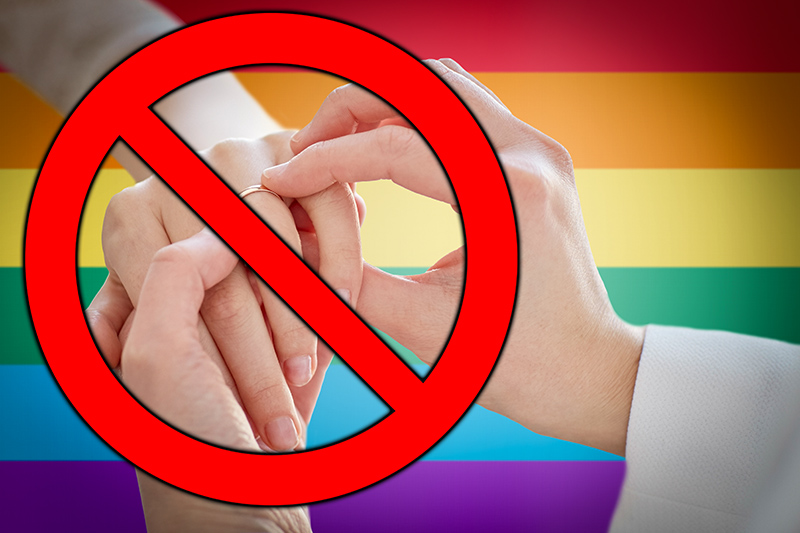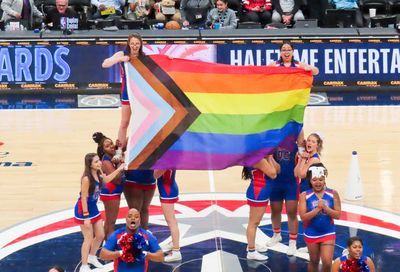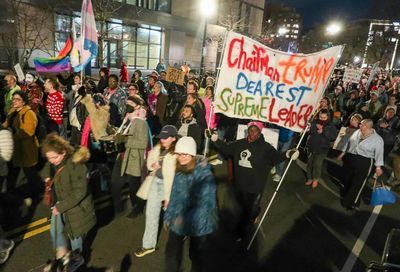Last Resistance: The remaining counties taking a stand against marriage equality
A handful of counties across the nation are still throwing up roadblocks to try and halt same-sex marriages

It’s the video that’s been circulating the Internet in recent days.
“I’d like you to put your phone away, please,” says Rowan County (Ky.) Clerk Kim Davis, holding up her hand in front of a cell phone camera. The videographer, a friend of David Moore and his partner, David Ermhold, refuses to stop filming, insisting it’s to protect her friends’ rights.
“We’ll take right here, and you can put that away,” Davis says calmly, before the friend hands over the phone and Moore shuts off the video recorder.
The resulting 11-and-a-half-minute YouTube video of Moore and Ermhold’s failed attempt to obtain a marriage license, has already received more than 1.7 million views. But Kim Davis has a lot more to worry about than a video. She’s being sued for refusing to issue marriage licenses to any couple, gay or straight.
Davis previously told The Courier-Journal after the Supreme Court legalized marriage equality that her “deep religious convictions” and belief in traditional marriage prevented her from issuing licenses to same-sex couples, so she decided not to issue licenses to any couples. Two weeks ago, the American Civil Liberties Union (ACLU) of Kentucky filed a lawsuit on behalf of four pairs of partners, two same-sex couples and two opposite-sex couples.
On Monday, U.S. District Court Judge David Bunning heard testimony from the plaintiffs’ lawyers, but Davis was not in court and has not yet signed paperwork acknowledging that she has been sued. Bunning continued the hearing to a date within 48 hours of when Davis is served in person and signs the appropriate paperwork, according to Amber Duke, a spokeswoman for the ACLU of Kentucky.
Duke also noted that two other counties — Casey and Whitley — are also refusing to issue marriage licenses to any couples.
Casey Davis, the clerk in Casey County, has also refused to issue marriage licenses. He met with Gov. Steve Beshear (D) to discuss his concerns, and said the governor told him to issue marriage licenses or to resign. Davis said he will do neither, citing his personal beliefs, instead proposing to The Associated Press that Kentucky should allow the automatic issue of marriages online so that clerks would not have to be involved in any aspect of same-sex nuptials.
In either case, neither Kim Davis’ or Casey Davis’ argument holds weight with the ACLU.
“The vast majority of Kentucky county clerk’s offices, and municipalities across the United States for that matter, are open to everyone on the same terms, including to people who are gay and lesbian,” says Michael Aldridge, the legal director of the ACLU of Kentucky. “Government officials, who have sworn an oath to uphold the law shouldn’t be able to pick and choose who they’re going to serve, or which duties they will perform, based on their religious beliefs.”
The issue has already become politicized in Kentucky, as Republican gubernatorial candidate Matt Bevin is now seizing on the clerks’ refusals as a campaign issue for this November’s upcoming election. Bevin’s opponent, Democratic Attorney General Jack Conway, previously declined to appeal a ruling finding Kentucky’s ban on same-sex marriage to be unconstitutional.
But the larger issue of refusing to participate in any aspect of same-sex marriages has found traction beyond the Bluegrass State in recent weeks, even though the majority of the nation’s counties are complying with the Supreme Court’s ruling. In Tennessee, the entire staff of the Decatur County Clerk’s Office resigned rather than issue same-sex marriage licenses. Clerks in Cleburne County, Ark., and Grenada County, Miss., also resigned their posts after citing religious objections to same-sex marriage. In Yazoo County, Miss., two justices of the peace announced that they will no longer officiate any weddings, though other options for same-sex couples looking to wed still exist. In Stark County, N.D., county commissioners voted to authorize the county’s deputy recorder to share the responsibility of issuing marriage licenses so that the chief county recorder would not be forced to violate her “personal, deep-seated beliefs” by issuing licenses to same-sex couples.
Lindsey Simerly, campaign manager for the Campaign for Southern Equality, said they have been tracking and calling county clerks in various states to see if those counties are complying with the Supreme Court’s ruling. While most states had some pockets of resistance, most counties have fallen into compliance as of Monday, with all parishes in Louisiana, and all counties in Mississippi and Tennessee issuing marriage licenses, according to their running tally.
The most egregious example of resistance right now is Alabama, where 13 counties are refusing to issue marriage licenses altogether, and three others are dallying due to understaffing or technical delays involved with changing the language on the marriage license application to be gender neutral, Simerly said. The situation was further complicated when Alabama Chief Justice Roy Moore made statements suggesting that probate judges in the state did not have to issue same-sex marriage licenses for 25 days, creating some confusion among county-level officials.
In Texas, Attorney General Ken Paxton (R) issued an opinion that said county clerks can opt out of issuing same-sex marriage licenses by citing religious convictions, but could face fines or lawsuits if they do. The ACLU of Texas reiterated that point in a letter sent to clerks who were reportedly reticent to issue same-sex licenses. Because many of Texas’s counties had been waiting for guidance from Paxton’s office, they did not begin issuing licenses for same-sex couples immediately after the Supreme Court’s decision. But Amanda Snipes, campaign manager of Southerners for the Freedom to Marry, said that as of Monday evening, 241 of Texas’s 254 counties were issuing licenses to same-sex couples, and another nine are planning to issue licenses once they can make software changes and update their marriage certificates.
According to Snipes, two counties were refusing to abide by the Supreme Court decision, and officials in two more counties could not be reached for comment.
While the majority of counties now appear to be in compliance with the Supreme Court’s ruling, the issue will likely be revisited. North Carolina, where same-sex marriage was legal prior to the Supreme Court decision, recently passed — and overrode a gubernatorial veto of — a bill that allows some state and county officials to exempt themselves from issuing licenses to any marriage that violates their personal, “sincerely held” beliefs.
Simerly said the Campaign for Southern Equality has received reports that 14 magistrates and five register of deeds employees in North Carolina have refused to perform same-sex marriages since the law’s passage. However, the law also says that county offices are supposed to, at least in theory, have another employee immediately available who is willing to perform or issue licenses for same-sex weddings. It remains to be seen whether that will work in reality.
Legislators in other states have suggested either allowing government officials to exempt themselves from same-sex weddings, or potentially passing a law similar to the type of Religious Freedom Restoration Acts (RFRAs) that passed in Indiana and Arkansas earlier this year. One of the states where such a possibility has been floated, though no concrete piece of legislation has yet been proposed, is Virginia.
Sarah McBride, a research associate for LGBT progress at the Center for American Progress, expects to see many attempts to pass such laws this winter, when state legislatures reconvene.
“One of the things that happened in Indiana was it took the wind out of the sails of what we call the ‘super-RFRAs’ this year,” McBride says, noting the backlash that occurred in the wake of the Indiana law’s passage. “But it remains to be seen whether the opposition to marriage equality, the opposition to LGBT rights, will come back in full force next winter, or whether the marriage decision, coupled with Indiana, really was their last stand.”
Support Metro Weekly’s Journalism
These are challenging times for news organizations. And yet it’s crucial we stay active and provide vital resources and information to both our local readers and the world. So won’t you please take a moment and consider supporting Metro Weekly with a membership? For as little as $5 a month, you can help ensure Metro Weekly magazine and MetroWeekly.com remain free, viable resources as we provide the best, most diverse, culturally-resonant LGBTQ coverage in both the D.C. region and around the world. Memberships come with exclusive perks and discounts, your own personal digital delivery of each week’s magazine (and an archive), access to our Member's Lounge when it launches this fall, and exclusive members-only items like Metro Weekly Membership Mugs and Tote Bags! Check out all our membership levels here and please join us today!

























You must be logged in to post a comment.